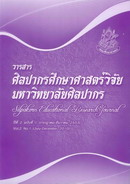การวิจัยและพัฒนาหลักสูตรตามรูปแบบวิธีเชิงนิเวศและพลวัตร ในระยะเปลี่ยนแปลงสำหรับเสริมสร้างทักษะทางสังคมของเด็ก เพื่อเตรียมเข้าศึกษาชั้นประถมศึกษาปีที่ 1
บทคัดย่อ
บทคัดย่อ
การวิจัยครั้งนี้ มีวัตถุประสงค์เพื่อพัฒนาและประเมินคุณภาพของหลักสูตรตามรูปแบบวิธีเชิงนิเวศและพลวัตรในระยะเปลี่ยนแปลง การวิจัยและพัฒนาหลักสูตรประกอบด้วย 4 ขั้นตอนได้แก่ 1) การศึกษาข้อมูลพื้นฐานเกี่ยวกับทักษะทางสังคมที่จำเป็นของเด็กในระยะเปลี่ยนแปลง ในบริบทของโรงเรียนประถมศึกษา 6 โรงเรียนในจังหวัดราชบุรี เกี่ยวข้องกับเอกลักษณ์ความสัมพันธ์ของคนในสังคมจังหวัดราชบุรีโดยเฉพาะกลุ่มครู ผู้ปกครองและกลุ่มเด็กอนุบาล 2) การร่างหลักสูตรตามรูปแบบวิธีเชิงนิเวศและพลวัตรในระยะเปลี่ยนแปลง 3) การทดลองใช้หลักสูตรโดยใช้รูปแบบการวิจัย A-B-A Design กับเด็กที่เตรียมเข้าศึกษาชั้นประถมศึกษาโรงเรียนอนุบาลราชบุรี อำเภอเมือง จังหวัดราชบุรี จำนวน 10 คน เป็นระยะเวลา 15 สัปดาห์ 4) การปรับปรุงหลักสูตรให้มีความสมบูรณ์บนฐานข้อมูลที่ได้จากการทดลอง
ผลการวิจัยพบว่า
1. หลักสูตรระยะเปลี่ยนแปลงสำหรับเด็กเพื่อเตรียมเข้าศึกษาชั้นประถมศึกษาปีที่ 1 (เด็กจบชั้นอนุบาลปีที่ 2) ได้พัฒนาขึ้นตามรูปแบบวิธีเชิงนิเวศและพลวัตรในระยะเปลี่ยนแปลง เพื่อเสริมสร้างทักษะทางสังคมที่จำเป็น 3 ด้าน ได้แก่ ด้านความร่วมมือ ด้านการควบคุมตนเองและด้านการรักษาสิทธิ์ มีองค์ประกอบ 13 องค์ประกอบ ได้แก่ วิสัยทัศน์ หลักการ พันธกิจ จุดมุ่งหมาย สาระการเรียนรู้ มาตรฐานการเรียนรู้ หน่วยการเรียนรู้ การจัดหน่วยการเรียนรู้ ระยะเวลาการเรียนรู้ การจัดประสบการณ์การจัดการเรียนรู้ สื่อการเรียนรู้ การวัดและประเมินผล บทบาทเด็ก เพื่อน ครูและผู้ปกครอง หลักสูตรประกอบไปด้วยหน่วยการเรียนรู้ 9 หน่วย แต่ละหน่วยมีการจัดประสบการณ์ การเรียนรู้ที่หลากหลายและการมีปฏิสัมพันธ์ระหว่างเด็ก เพื่อน ครู และผู้ปกครอง
2. การประเมินคุณภาพหลักสูตรตามรูปแบบวิธีเชิงนิเวศและพลวัตรในระยะเปลี่ยนแปลง โดยการทดลองใช้หลักสูตร พบว่า เด็กเตรียมเข้าศึกษาชั้นประถมศึกษาปีที่ 1 มีทักษะทางสังคมทั้งสามด้าน สูงกว่าก่อนใช้หลักสูตรอย่างมีนัยสำคัญทางสถิติที่ระดับ .001 และมีแนวโน้มของทักษะทางสังคมทั้ง 3 ด้านสูงขึ้นในระยะทดลอง แต่มีแนวโน้มของทักษะทางสังคมทั้งสามด้านลดลงเมื่อระงับการจัดกระทำ
Abstract
The research aims to develop a curriculum based on the Ecological and Dynamic Model of Transition and to evaluate the efficiency of the implementation of the curriculum. The research and development of the curriculum has been done through the 4 stages: 1) researching fundamental data on essential social skills for first graders in purposively selected 6 elementary schools in Ratchaburi Province, together with the specific socio-cultural context of community people; 2) developing a curriculum base on the Ecological and Dynamic Model of Transition to enhance three essential social skills for kindergarten children moving on to first grade; 3) evaluating the efficiency of the curriculum utilizing the A-B-A design, with 10 kindergarten children moving on to first grade, in Anuban ratchaburi school, muang district, Ratchaburi province, for the duration of 15 weeks; 4) revising the curriculum using the data obtained from the evaluation stage.
Research findings are as the followings:
1. The transition curriculum for children preparing for first grade based on the ecological and dynamic model of transition to enhancement three social skills: cooperation, self-control, and assertion was consisted of 13 components: vision, principle, mission, objection, the content, learning standards, learning units, learning units management, time table, learning experience, instruction media, assessment and evaluation, and role of children, peer, teacher and parents. The resulting curriculum consisted of 9 learning units including learning experiences, that interact with each other, the relationships between children, peer, teacher, and parents.
2. The evaluation of a curriculum based on the Ecological and Dynamic Model of Transition after implementing curriculum showed that the three social skills possessed by the kindergarten children seem to be improved statistically significance at .001 level. However, those three social skills have shown to be inclined during the experimental stage, but are declined during the follow up period when the treatment has been withdrawn.





